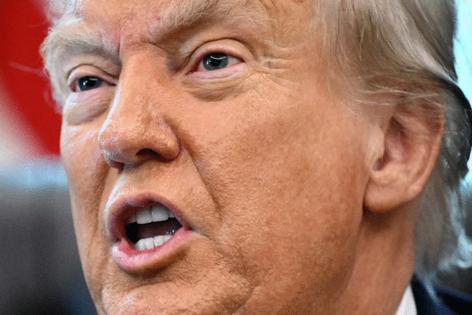BBC apologizes to Trump, says no basis for defamation claim
Published in News & Features
The British Broadcasting Corp. issued a formal apology to Donald Trump on Thursday over the misleading edit of the U.S. president’s speech in a documentary program late last year, but rejected his demands for compensation.
BBC Chairman Samir Shah sent a personal letter to the White House “making clear to President Trump that he and the corporation are sorry for the edit of the President’s speech on 6 January 2021, which featured in the programme,” the BBC said in a statement.
Separately, lawyers for the national broadcaster have written to Trump’s legal team in response to the president’s threats of legal action, seeking no less than $1 billion in damages if the BBC didn’t issue an apology, retract the documentary and compensate the president appropriately for “harm caused.”
“While the BBC sincerely regrets the manner in which the video clip was edited, we strongly disagree there is a basis for a defamation claim,” the broadcaster said in a statement.
The BBC also said it would not rebroadcast the documentary "Trump: A Second Chance?" on any of its platforms.
In a letter Sunday, Trump attorney Alejandro Brito said if the BBC didn’t comply by Nov. 14 at 5 p.m. New York time, the president would “be left with no alternative but to enforce his legal and equitable rights,” including by filing a lawsuit.
“It is now clear that BBC engaged in a pattern of defamation against President Trump by intentionally and deceitfully editing his historic speech in order to try and interfere in the Presidential Election,” a spokesman for Trump’s legal team said Thursday. “President Trump will continue to hold accountable those who traffic in lies, deception, and fake news.”
The editing of the Panorama documentary spliced together two parts of Trump’s speech before the riot at the U.S. Capitol in a way that gave the impression of a direct call for violent action. The controversy surrounding the edit has embroiled the political and media establishment in the U.K. BBC Director-general Tim Davie and head of news Deborah Turness both stepped down days after the controversy came to light when the Daily Telegraph newspaper published a leaked memo from the network.
The BBC apology came after a second instance of misleading editing by the BBC came to light. A clip of the same speech also aired on the BBC’s current affairs program Newsnight in 2022, the Telegraph reported on Thursday.
Trump has a history of taking legal action against media outlets for reporting the president sees as unfair or biased. By using, or threatening to use, the courts and his administration’s authority, Trump has already forced major concessions from some of the largest outlets in the U.S.
CBS agreed to pay $16 million to settle a suit by the president accusing the network of election interference over how the network’s news show 60 Minutes edited a quote from an interview with presidential candidate Kamala Harris, which he claimed made her sound more coherent. ABC paid $15 million to settle a suit over news host George Stephanopoulos’s incorrect reference to Trump being “found liable for rape” in a lawsuit by E. Jean Carroll, while the jury had only found him liable for sexual abuse. The jury didn’t accept Carroll’s rape claim.
The president also has multi-billion lawsuits pending in Florida against the New York Times and the Wall Street Journal over allegations of defamation that both organizations deny. The Times was sued over an alleged pattern of coverage that harmed the president’s brand and reputation, while the Journal was sued over a report that Trump had sent a crude birthday note to disgraced financier Jeffrey Epstein in 2003.
Yet there are significant legal differences between the claims against the BBC and the U.S. media companies that Trump has previously targeted. The Panorama documentary at the center of the dispute was never aired in the U.S. and the program was geo-blocked on the BBC’s streaming service.
“It is so difficult to prove defamation in the U.S., and for a program that Americans have not seen,” said Claire Enders, a media analyst and founder of Enders Analysis. “There is no basis for the lawsuit, and there would be no basis for a settlement.”
It might be too late for Trump to sue in Britain because the broadcast was more than a year ago, which would fall outside the U.K.’s so-called statute of limitations. Florida, on the other hand, has a two-year statute of limitations on defamation cases.
Trump’s lawyer indicated in his letter to the BBC on Sunday that the suit would be filed in Florida, but the timing is unclear. The Friday deadline is for the BBC to respond and that could trigger more negotiations before a case is filed.
____
(With assistance from Hadriana Lowenkron.)
©2025 Bloomberg L.P. Visit bloomberg.com. Distributed by Tribune Content Agency, LLC.







Comments